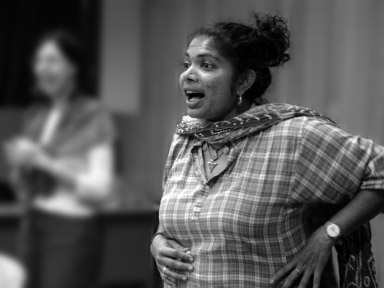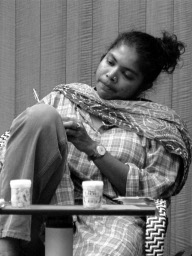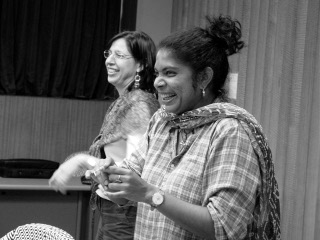
Susanna George, former executive director of Isis International takes a retrospective look at the processes that motivated the conceptualisation of PC4D. She likewise reflects on the research’s conclusion, which (re)invigorates a development paradigm that places people and feminist communications at its core. She explains why the master’s house cannot be destroyed by the master’s tools.
CNN
CNN is an international cable network with its headquarters in Atlanta, Georgia, United States and its major bureaus in London, United Kingdom and Hong Kong, China. Employing some 4,000 news professionals, CNN, along with Time magazine and AOL are subsidiaries of the multi-million dollar company, Time Warner. In 2007, Time Warner reported profits amounting to more than US$1 billion.
Cisco Systems
Founded in 1984 by some computer scientists from Stanford University, Cisco sells computer hardware, software applications and offers technical support. Its products and services also come under the well-known brands such as Linksys, WebEx, IronPort, and Scientific Atlanta.
Hewlett Packard
Hewlett Packard is among the oldest company in Sillicon Valley, specialising in electronic gadgets such as personal computers, laptops, servers, printers, photocopiers, LCD projectors, digital cameras, among many others. In 2002, it acquired its rival Compaq and lately, Electronic Data Systems, a move that is seen to challenge the dominance of IBM.
Sources: Allison, Kevin. (2008). “Laptop sales help Hewlett-Packard beat forecasts.”URL:http://www.ft.com/cms/s/0/ 8307fbb8-6e50-11dd-b5df-0000779fd18c.html ; Cisco Systems, http://www.cisco.com ; CNN, http://www.cnn.com , and Sweney, Mark. (2007). “Time Warner profits meet expectations.” URL: http://www.guardian.co.uk/media/2008/feb/06/ digitalmedia.mediabusiness?gusrc=rss&feed=media
Isis: What was your inspiration in conceptualising PC4D?
Susanna George: The concept of PC4D [intended] to look at all communication tools because six years ago [there was this thinking that was] leaning into new information and communications technologies, internet, computer, e-mail - everything that facilitates digitally.
[It was saying that] there is no other way for women to communicate except through new ICTs. It was too quick, shortsighted and hasty in the sense that it did not look at how communication tools and communications work in different cultural, social contexts, and permeate social spaces.
We did not want to assume that the new ICTs are the way, the truth and the life. We decided that we would try to find out how women communicate at the grassroots. What tools do they prefer? What are the tools they are more comfortable with?
We decided that we would work with intermediary groups who work with the grassroots. And they would tell us what tools their partners use as well as what style of communications.
Isis: Was the WSIS process a factor behind PC4D? SG: The idea to do the project came before the WSIS process but it was an interesting space. At that time, speaking of an information society, it failed to include all other aspects of that society. It was a sort of man and his computer kind of idea. We made it quite certain that this research would be very important. To that degree, it influenced the research.
 Isis: How would you assess the analyses of gender and communications, prior to PC4D?
Isis: How would you assess the analyses of gender and communications, prior to PC4D?
SG: There has been such a lot of theorising about gender and communications from before. The WSIS process brought into the discourse of development the whole IT industry.
It consolidated the strategic role of IT and development so I think it is not so much women and communications but women and communications in the development context because there is a lot of theorising that has taken place about women and communications that has nothing to do with development.
But in the context of development, definitely in the era 10 years after Beijing, there was very much a strong and important lobby by feminist activists who were focused on new ICT, pushing for women’s engagement with the technology. That coincided with the UN and development agencies, sort of new alliances and link ups with the communications organisations like CNN, Cisco, HP etc. They were all sort of coming into the picture of development.
Maybe because of the things that were happening in the industry. Maybe corporate responsibility.
A cynical eye would say, maybe they were looking for new markets via the development process.
The new development paradigm which was IT-focused, meaning without IT there is no development was not interrogated and so what was coming out as gender and communications theory was basically: give women a piece of the pie.
So whatever it was, there was a coinciding of forces in the sense that people were talking about the importance of IT for development like for example in Malaysia, the whole view of the knowledge society and then Malaysia was building up the multi-media corridor, and wanted to become IT-savvy.
At that time, there was the thought that you cannot do it without the big industries helping in these development processes. And because of that, there was a lot of conversation on gender or women’s access to that development pie.
So it was a very old way of looking at gender. It is as though there is a pot of something and you divide it into half for women. [It was saying,] “include women for development” [but ] without questioning the development. It was like asking, we want half of that without asking what is that half.
The new development paradigm which was IT-focused, meaning without IT there is no development, was not interrogated. And so at that time what was coming out as gender and communications theory was basically: give women a piece of the pie.
Isis: There were feminist activists engaged in the process as you said. Were they more Northern or some were also from the South?
SG: They were from North and South. But you know the feminist movement. I mean I cannot say definitely that they were part of the feminist movements. They were feminists in the broader sense of the word.
Isis: What is/ are the most important points made by PC4D, for you and why?
SG: It was the new role that was given to technology in the new development paradigm which was technology-focused. In that IT-focused development paradigm, gender was also a part of it. The thing about it is that the women’s movement has for some time been struggling with how to engage with the international development bodies. The international development bodies, clearly, are also struggling to find that place because it is a negotiated agreement among governments. Very often, compromises women make in order to get gender into the document – in the eyes of some feminists, would not be seen as feminist – because the compromises that you make have in some ways eroded some kind of basic values. That is always the problem.
It is not that I do not want the promotion of IT. I think more and more I recognise how useful it is for women’s networks. But simply to recognise it not as the sole route by which to empower women.
The research findings really affirm a multi-level approach to our communications work. It affirms the idea of looking at communications in a way that recognised its cultural and social specificity, that you cannot take technology and lay it on people and just have it oked. Many more people than we imagine are using other forms of technologies, that many more people than we imagine are using new technologies in a very minimal way.
Minimal usage is not a problem but the problem was basically that [technology] was seen as [a] solution more than what people engaging it were seeing it as. I think this is the reason why we have been resistant to this IT evangelism, as we used to call it. I used to call it IT fundamentalism but than I realised that fundamentalism is too harsh a word.
It is not that I do not want the promotion of IT. I think more and more I recognise how useful it is for women’s networks. But simply to recognise it not as the sole route by which to empower women.
That’s the other thing, empowerment. The word has lost its integrity because people actually use it in almost any context. Because they do that, it has become a cheap word. It is also being used as well in the context of IT as in empowering women through ICT, not taking into account how deep the patriarchal project has been in the past 2,000 years and how dismantling it is not simply about technology.
Audre Lorde always poses the question to us, “Can you dismantle the master’s house using the master’s tools?” She believes that you cannot dismantle the master’s house using the master’s tools.
So a lot of our discussions in Isis was, “Is IT the master’s tools?” And If IT is the master’s tool, can we use it to dismantle the master’s house?
The World Summit on the Information Society (WSIS) was a multi-stakeholder process that formally recognised the emergence of new information and communications technologies (ICTs), held in two parts, Geneva, Switzerland in 2003 and Tunis, Tunisia in 2005. Two key issues surfaced in the process: internet governance and the digital divide, which were eventually tackled by technical working groups. However, civil society organisations were unhappy with the results of the process that they made their own statements, “Shaping Information Society for Human Needs” and “Much More Could Have Been Achieved” in 2005. Since 2005, WSIS evolved into two processes, the Internet Governance Forum and the United Nations Global Alliance for ICT and Development.
Source: WSIS, http://www.itu.int/wsis/index.html and UN Non-Governmental Liaison Service section on WSIS, http://www.un-ngls.org/wsis.htm
Isis: Why is communications often not seen as a political issue by women’s and social movements?
SG: There are people who would speak of themselves as communications activists. There is an advocacy called communication rights and there is a field called development communications.
I think the reason why people do not see communications [as politica] because it is a little bit like air and water. It is so much a part of who we are. We take it for granted.
I think communications is the absolute, at the cellular level, if we think of our society as a body and all of us as cells in the body. Communications is in each cell. It is not possible for society to be formed without communications. It is not possible for people to build relationships without communications. Governments, organisations, and families are based on it.
Communications are so fundamental and we are doing it constantly. We do it with the way we dress ourselves, with how we speak and what we say. It is so much a part of who we are but I think people do not realise how political it is.
I would say that almost all of the conflicts that we have currently have to do with a breakdown in communications—true communications and not the gun pointing kind of communications. We are no longer communicating with what was given to us as human beings such as language and form - social and cultural forms of communications. This is less true of us today.
Audre Lorde
(18 Feb. 1934 – 17 Nov. 1992)
Audre Lorde was an African-Carribean immigrant in the United States. She described herself as a black, lesbian, mother, warrior, and poet. Lorde was a co-founder of the Kitchen Table-Women of Color Press and an editor of the lesbian journal Chrysalis. Before she died, she took the name Gamba Adisa, meaning “Warrior: She Who Makes Her Meaning Clear.”
Sources: Academy of American Poets. (nd). “Audre Lorde.” URL: http://www.poets.org/poet.php/ prmPID/306 ; University of Illinois at Chicago. (nd). “Audre Lorde.” http://www.uic.edu/depts/quic/ history/audre_lorde.html
In the context of social movements, I sit on boards of organisations. Having headed Isis for eight years and now sitting in its governing body, I can say that a lot of people shared Isis perspective on communications. We have always prioritised communications. It is important to invest in web managers that we ensure all our staff are computer literate and savvy and that we train them to effectively and appropriately communicate verbally and in written form.
Communications is a fundamental skill in building movements. Isis, for instance, describes itself as an information and communications organisation that strengthens the backbone, the highways and byways of networks and organisations.
I remember there was a regional which had a steering committee. Initially they did not want Isis to be part of the committee because they said Isis was not representative of a region or a sub- region. So I said, that is the least important aspect of being in a steering committee.
Isis was doing crucial work for this network. I mean all the [discussions], Isis turns them into understandable information. So I said, Isis provides you with a mailing list, a storage space for all your information, put up a website for you, have done various sorts of communications work for that network and all of that is about the network. So all aspects of networking, I would say 95 per cent of networking is about communications. We got into the steering committee.
Likewise in movement-building, once you have built the substance of your agenda, when you have your theory or strategies, the rest is communications. How you communicate this idea to people within your network or movement. The game plan is to have communications in every step of the way, whether it is a strategy that you are going to implement, whether it is a campaign, whether it is a media blitz.
Isis: What is your impression on grassroots women’s notions of empowerment cited in the study?
SG: They sound like well-thought out notions. People were saying what is important to them. It is clear that these are the aspects that they can identify with, aspects of their lives where they want to see change. Economic, social, political are the first three and then self and the family.
It covers the different aspects of the life of a human being. Inside the individual agency and self- transformation part, the only thing that was not said was control. The question of choice, to be able to decide, to be able to understand what is placed before you. Being empowered, to realise your own vision, perspectives, values that comes with a certain amount of individual agency. It is a little bit more than decision-making. It is to realise your vision of your life based on your values. That kind of empowerment is something that you look forward to. If they were as they were, I think we would have a different sort of society.
Isis: What do you think are the challenges posed by PC4D for civil society, women’s groups, and Isis?
SG: PC4D is an old concept. It is not something Isis created but is re-creating. PC4D has been around for sometime. Development communications is an idea that has been around for sometime. So PC4D is another version of that, a reminder.
But what we are trying to say is to take into account gender, class and other differences. To absorb that would entail an entire paradigm shift, about how to think of development as a whole.
For social movements and women’s movements
It can change social movements in the sense that they would articulate it more in their work than before. It is not so new. I think organisations have been thinking about these things but as to whether they are actually doing something about it in a concrete manner is not clear.
It is a challenge, along with everything else, taking into account what people need, looking at people’s real issues, to understand them and integrate them into your work. It is not just in communications but in every aspect, integrate people’s perspectives, their identified needs and realities rather than your identified needs and realities for them.
For Isis
We have engaged and informed an advocacy to put forward a new development paradigm, incorporating a feminist communications perspective. So the challenge would be to integrate and implement the research findings into its actual work.
Isis: Have your expectations from PC4D been met?
SG: It far exceeds my expectations because what happened was the concept became a project. Being a concept on paper, it has come to a conclusion, a publication that is well-thought through. Research brought people together to actually talk about it.
Because what happened in the project was that there was a process and the process actually invigorated new thinking among all the people who participated in the project. So I think from the people I talked to, they have been inspired by having done this research. It is not a research question that they thought of. But when they thought of it and they started working on it, they were so happy to work on it because it was a question that they have in their own minds.
I think that was important when people were actually able to engage with the concept and develop their own theories and see for themselves the realities on the ground. Because even if you have the idea, unfortunately without money, it is very difficult to do this cross regional comparative research. And for all of those who participated in this project, they are going to use their research to promote certain ideas in their context, to possibly look for different sources of funding, new partners and networks that they can be a part of, new levels of discourse that they can engage in.
So it has moved beyond my expectations.





 The
The 
 Isis Resource Center holds one of the largest feminist collections of materials in the Global South. With 40 years of publication experience, Isis holds a vast collection.
Isis Resource Center holds one of the largest feminist collections of materials in the Global South. With 40 years of publication experience, Isis holds a vast collection.